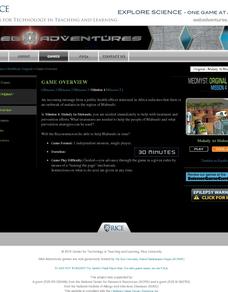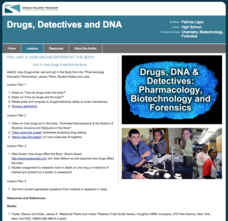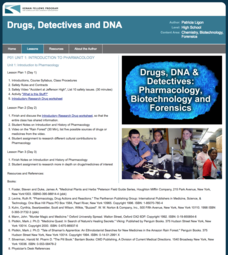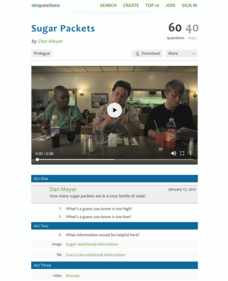Howard Hughes Medical Institute
Got Lactase? Blood Glucose Data Analysis
Many physicals include a blood glucose test, but what are doctors actually testing? Scholars graph and interpret blood glucose data, allowing them to observe the differences in lactase persistence and draw conclusions. They then connect...
Serendip
Carbohydrate Consumption, Athletic Performance and Health – Using Science Process Skills to Understand the Evidence
Should athletes carb load before an event or consume carbohydrates during the competition? Scholars discuss how to set up a hypothesis and experiment to answer a question relating carbohydrates and athletic performance. Then, they read...
Serendip
Vitamins and Health – Why Experts Disagree
Should people take vitamins or get the needed minerals through diet? Experts disagree based on many different factors. Scholars compare study findings and discuss the differences. They learn the importance of comparing results across...
Serendip
Should You Drink Sports Drinks? When? Why?
New research proves even rinsing your mouth with carbohydrates without swallowing improves performance of the central nervous system. While some think sports drinks are amazing, others say they are a waste of money. Scholars learn about...
Serendip
Get the Lead Out!
Around 500,000 children under the age of six suffer from elevated levels of lead in their blood in the United States. Scholars apply their knowledge about lead to a fun game. As they correctly answer questions, they move their pieces...
PBS
The Lowdown — Exploring Changing Obesity Rates through Ratios and Graphs
Math and medicine go hand-in-hand. After viewing several infographics on historical adult obesity rates, pupils consider how they have changed over time. They then use percentages to create a new graph and write a list of questions the...
PBS
Opioids in Our Community—Middle School
How do opioids affect the lives of families and individuals within a community? Scholars explore the topic with a series of informative, thought-provoking videos. They also complete worksheets and discuss the effects of the opioid...
Delaware Health and Social Services
My Life. My Plan: Women
Nationwide, over 40 percent of pregnancies are unintended. A lesson designed for women of childbearing age asks them to consider their goals and provides information about reproductive health. Learners view a PowerPoint presentation and...
Center for Technology in Teaching and Learning
MedMyst Mission 4: Malady In Mabuufo
An outbreak of malaria requires your help to stop its spread. To discover the pathogen that causes malaria and multiple ways to fight the illness scholars play games, answer short quizzes, and learn scientific concepts with the fourth...
Center for Technology in Teaching and Learning
MedMyst: Animal Alert!
An outbreak of disease is affecting people in a distant region—it's time to get to work! Scholars take the role of scientists as they learn more about the illness, discover the possible causes, and find a way to prevent the further...
Center for Technology in Teaching and Learning
MedMyst: Disease Defenders
The news often refers to a team of experts handling situations and outbreaks of illnesses. Young scientists learn about such a team as they train to prevent infectious disease outbreaks Scholars meet three experts, learn about...
NASA
Planning Time
Ever feel there's just not enough hours in the day? Young adults explore an important part of personal development using a group of activities. After comparing how they actually spend their time with how they would like to, scholars...
Whole Person Associates
Teen Self Esteem Workbook
Happy teens are healthy teens! Pupils embark on a self-reflective journey using a series of assessments and discussions to promote personal development. The lessons focus on identifying low and high self-esteem attitudes and behaviors,...
University of Rhode Island
Success Through Self Awareness
Knowing yourself is the first step to a successful life! Introduce scholars to the value of self awareness through an eight-part personal development unit. A series of hands-on activities provides participants with insight into their...
Kenan Fellows
Unit 4: The Brain
Drugs interact with the brain to alter moods, emotions, and behaviors by changing the brain's chemistry, perceptions, and interactions. The final lesson in the Pharmacology unit shows scholars experiments, has them complete four labs,...
Kenan Fellows
Unit 3: How Drugs Enter/Exit the Body
The third of a four-part series on Pharmacology teaches scholars how drugs enter and exit the body, how they act inside the body, how they affect the brain, and more. Over the course of the unit, groups complete two labs and one...
Kenan Fellows
Unit 1: Introduction to Pharmacology
Learn about the study of medications, including those found in nature and those made synthetically. The first of four lessons in a series on pharmacology includes lectures, hands-on experiments, research, and more.
Essential Energy
Being a Safety Star (Stage 3)
A spark of static electricity contains up to 3,000 volts, while a lightning strike contains around 3,000,000 volts. To understand electricity, its power, and the safety considerations relating to it learners engage in a comprehensive...
Serendip
Food, Energy and Body Weight
High schoolers learn why humans need calories, how they control weight with food choices, and the impact of exercise on energy. Scholars then apply their understanding to a case study of lunch choices and exercise.
US Department of Veterans Affairs
Sample Flexibility Plan for Beginners
Boost flexibility with a set of stretches designed for beginners. Pictures and descriptions guide readers through a variety of stretches while standing, sitting, and lying on the floor.
Howard Hughes Medical Institute
How the Body Uses Fat
Not all fat is bad—eating good fats actually helps with weight loss. Learn how the body uses fat through a 27-slide presentation that breaks down the path fat takes from entering to exiting the body. Understanding why fat is helpful and...
101 Questions
Sugar Packets
Depending on your eating habits, you just may not want to know the answer to the inquiry-based question! The task is to determine the number of sugar packets in one 20-ounce soda. Learners use nutritional information from the sugar and...
Kenan Fellows
Unit 1: Introduction to Biotechnology
Biotechnology is big! Introduce the uses of biotechnology to science scholars with a fascinating, fact-filled unit. The first installment in a series of four biotechnology units covers the role biotechnology plays in human and...
Kenan Fellows
Unit 3: Genetic Variation
What happens when genes change? Junior genetic investigators examine the effects of mutation in the third unit of a four-part Biotechnology series. Individuals discover the types of mutations through a series of PowerPoints, then partner...

























